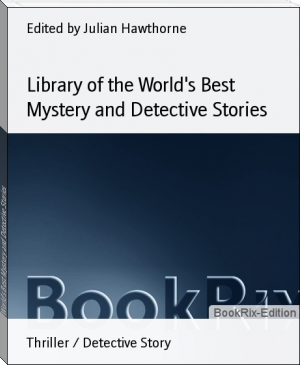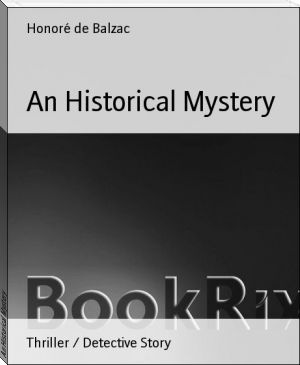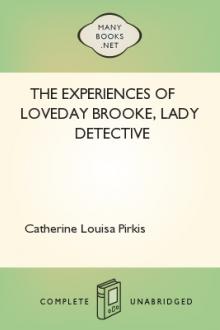Library of the World's Best Mystery and Detective Stories by Edited by Julian Hawthorne (best affordable ebook reader txt) 📖

- Author: Edited by Julian Hawthorne
Book online «Library of the World's Best Mystery and Detective Stories by Edited by Julian Hawthorne (best affordable ebook reader txt) 📖». Author Edited by Julian Hawthorne
"The grand Desterham of Babylon sent hither a pretty satrap in the name of King Moabdar, to have me strangled. This man arrived with his orders: I was apprised of all; I caused to be strangled in his presence the four persons he had brought with him to draw the noose; after which I asked him how much his commission of strangling me might be worth. He replied, that his fees would amount to above three hundred pieces of gold. I then convinced him that he might gain more by staying with me. I made him an inferior robber; and he is now one of my best and richest officers. If thou wilt take my advice thy success may be equal to his; never was there a better season for plunder, since King Moabdar is killed, and all Babylon thrown into confusion."
"Moabdar killed!" said Zadig, "and what is become of Queen Astarte?"
"I know not," replied Arbogad. "All I know is, that Moabdar lost his senses and was killed; that Babylon is a scene of disorder and bloodshed; that all the empire is desolated; that there are some fine strokes to be struck yet; and that, for my own part, I have struck some that are admirable."
"But the queen," said Zadig; "for heaven's sake, knowest thou nothing of the queen's fate?"
"Yes," replied he, "I have heard something of a prince of Hircania; if she was not killed in the tumult, she is probably one of his concubines; but I am much fonder of booty than news. I have taken several women in my excursions; but I keep none of them. I sell them at a high price, when they are beautiful, without inquiring who they are. In commodities of this kind rank makes no difference, and a queen that is ugly will never find a merchant. Perhaps I may have sold Queen Astarte; perhaps she is dead; but, be it as it will, it is of little consequence to me, and I should imagine of as little to thee." So saying he drank a large draught which threw all his ideas into such confusion that Zadig could obtain no further information.
Zadig remained for some time without speech, sense, or motion. Arbogad continued drinking; told stories; constantly repeated that he was the happiest man in the world; and exhorted Zadig to put himself in the same condition. At last the soporiferous fumes of the wine lulled him into a gentle repose.
Zadig passed the night in the most violent perturbation. "What," said he, "did the king lose his senses? and is he killed? I cannot help lamenting his fate. The empire is rent in pieces; and this robber is happy. O fortune! O destiny! A robber is happy, and the most beautiful of nature's works hath perhaps perished in a barbarous manner or lives in a state worse than death. O Astarte! what is become of thee?"
At daybreak he questioned all those he met in the castle; but they were all busy, and he received no answer. During the night they had made a new capture, and they were now employed in dividing the spoils. All he could obtain in this hurry and confusion was an opportunity of departing, which he immediately embraced, plunged deeper than ever in the most gloomy and mournful reflections.
Zadig proceeded on his journey with a mind full of disquiet and perplexity, and wholly employed on the unhappy Astarte, on the King of Babylon, on his faithful friend Cador, on the happy robber Arbogad; in a word, on all the misfortunes and disappointments he had hitherto suffered.
THE FISHERMAN
At a few leagues' distance from Arbogad's castle he came to the banks of a small river, still deploring his fate, and considering himself as the most wretched of mankind. He saw a fisherman lying on the brink of the river, scarcely holding, in his weak and feeble hand, a net which he seemed ready to drop, and lifting up his eyes to Heaven.
"I am certainly," said the fisherman, "the most unhappy man in the world. I was universally allowed to be the most famous dealer in cream cheese in Babylon, and yet I am ruined. I had the most handsome wife that any man in my station could have; and by her I have been betrayed. I had still left a paltry house, and that I have seen pillaged and destroyed. At last I took refuge in this cottage, where I have no other resource than fishing, and yet I cannot catch a single fish. Oh, my net! no more will I throw thee into the water; I will throw myself in thy place." So saying, he arose and advanced forward in the attitude of a man ready to throw himself into the river, and thus to finish his life.
"What!" said Zadig to himself, "are there men as wretched as I?" His eagerness to save the fisherman's life was as this reflection. He ran to him, stopped him, and spoke to him with a tender and compassionate air. It is commonly supposed that we are less miserable when we have companions in our misery. This, according to Zoroaster, does not proceed from malice, but necessity. We feel ourselves insensibly drawn to an unhappy person as to one like ourselves. The joy of the happy would be an insult; but two men in distress are like two slender trees, which, mutually supporting each other, fortify themselves against the storm.
"Why," said Zadig to the fisherman, "dost thou sink under thy misfortunes?"
"Because," replied he, "I see no means of relief. I was the most considerable man in the village of Derlback, near Babylon, and with the assistance of my wife I made the best cream cheese in the empire. Queen Astarte and the famous minister Zadig were extremely fond of them."
Zadig, transported, said, "What, knowest thou nothing of the queen's fate?"
"No, my lord," replied the fisherman; "but I know that neither the queen nor Zadig has paid me for my cream cheeses; that I have lost my wife, and am now reduced to despair."
"I flatter myself," said Zadig, "that thou wilt not lose all thy money. I have heard of this Zadig; he is an honest man; and if he returns to Babylon, as he expects, he will give thee more than he owes thee. Believe me, go to Babylon. I shall be there before thee, because I am on horseback, and thou art on foot. Apply to the illustrious Cador; tell him thou hast met his friend; wait for me at his house; go, perhaps thou wilt not always be unhappy.
"O powerful Oromazes!" continued he, "thou employest me to comfort this man; whom wilt thou employ to give me consolation?" So saying, he gave the fisherman half the money he had brought from Arabia. The fisherman, struck with surprise and ravished with joy, kissed the feet of the friend of Cador, and said, "Thou are surely an angel sent from Heaven to save me!"
Meanwhile, Zadig continued to make fresh inquiries, and to shed tears. "What, my lord!" cried the fisherman, "art thou then so unhappy, thou who bestowest favors?"
"An hundred times more unhappy than thou art," replied Zadig.
"But how is it possible," said the good man, "that the giver can be more wretched than the receiver?"
"Because," replied Zadig, "thy greatest misery arose from poverty, and mine is seated in the heart."
"Did Orcan take thy wife from thee?" said the fisherman.
This word recalled to Zadig's mind the whole of his adventures. He repeated the catalogue of his misfortunes, beginning with the queen's spaniel, and ending with his arrival at the castle of the robber Arbogad. "Ah!" said he to the fisherman, "Orcan deserves to be punished; but it is commonly such men as those that are the favorites of fortune. However, go thou to the house of Lord Cador, and there wait my arrival." They then parted, the fisherman walked, thanking Heaven for the happiness of his condition; and Zadig rode, accusing fortune for the hardness of his lot.
THE BASILISK
Arriving in a beautiful meadow, he there saw several women, who were searching for something with great application. He took the liberty to approach one of them, and to ask if he might have the honor to assist them in their search. "Take care that thou dost not," replied the Syrian; "what we are searching for can be touched only by women."
"Strange," said Zadig, "may I presume to ask thee what it is that women only are permitted to touch?"
"It is a basilisk," said she.
"A basilisk, madam! and for what purpose, pray, dost thou seek for a basilisk?"
"It is for our lord and master Ogul, whose cattle thou seest on the bank of that river at the end of the meadow. We are his most humble slaves. The lord Ogul is sick. His physician hath ordered him to eat a basilisk, stewed in rose water; and as it is a very rare animal, and can only be taken by women, the lord Ogul hath promised to choose for his well-beloved wife the woman that shall bring him a basilisk; let me go on in my search; for thou seest what I shall lose if I am prevented by my companions."
Zadig left her and the other Assyrians to search for their basilisk, and continued to walk in the meadow; when coming to the brink of a small rivulet, he found another lady lying on the grass, and who was not searching for anything. Her person seemed to be majestic; but her face was covered with a veil. She was inclined toward the rivulet, and profound sighs proceeded from her mouth. In her hand she held a small rod with which she was tracing characters on the fine sand that lay between the turf and the brook. Zadig had the curiosity to examine what this woman was writing. He drew near; he saw the letter Z, then an A; he was astonished; then appeared a D; he started. But never was surprise equal to his when he saw the two last letters of his name.
He stood for some time immovable. At last, breaking silence with a faltering voice: "O generous lady! pardon a stranger, an unfortunate man, for presuming to ask thee by what surprising adventure I here find the name of Zadig traced out by thy divine hand!"
At this voice, and these words, the lady lifted up the veil with a trembling hand, looked at Zadig, sent forth a cry of tenderness, surprise and joy, and sinking under the various emotions which at once assaulted her soul, fell speechless into his arms. It was Astarte herself; it was the Queen of Babylon; it was she whom Zadig
 However, all readers - sooner or later - find for themselves a literary genre that is fundamentally different from all others.
However, all readers - sooner or later - find for themselves a literary genre that is fundamentally different from all others. 




Comments (0)